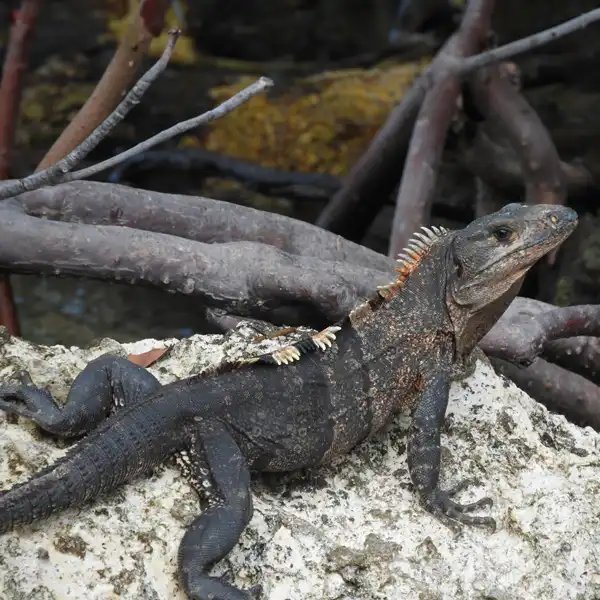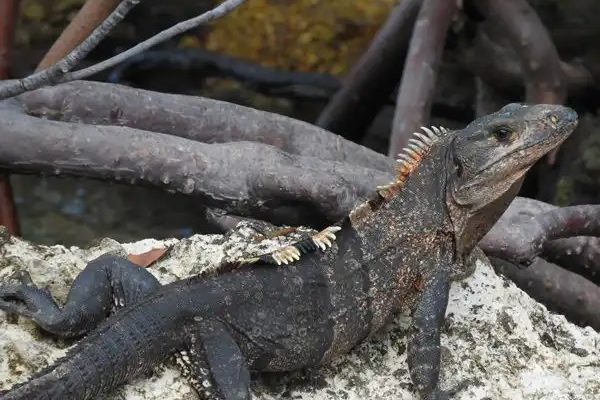
Just like how your dog wags its tail to greet you or your cat might curl up on your lap, spiny-tailed iguanas have their own ways of interacting with their human companions. They might not express affection in the same manner as more traditional pets, but they can certainly develop a sense of familiarity. Understanding this can help you foster a better relationship with your scaly friend. So, grab your favorite drink, and let’s chat about how these remarkable creatures perceive their humans.
Understanding Spiny-Tailed Iguanas
Spiny-tailed iguanas, known scientifically as *Ctenosaura*, are native to Central America and parts of Mexico. These reptiles are known for their resilient nature and adaptability. They thrive in various habitats and can often be seen basking in the sun or climbing trees. With a robust body and an impressive spiny tail, they’re not just striking to look at; they’re also quite intelligent in their own right.
Now, you might be wondering, what does this have to do with recognizing their owners? Well, understanding their behavior and intelligence is crucial. Spiny-tailed iguanas have an acute sense of sight, which helps them spot threats in the wild. They might not rely on smell as much as dogs do, but vision is key for these reptiles. Because they can see well, they’re capable of recognizing familiar faces—especially when you consistently interact with them.
Yet, like many reptiles, their social structure is different. In the wild, spiny-tailed iguanas live in groups, but they also establish territories. This mix of social interaction and individual space means they can recognize other iguanas and humans, but the depth of that recognition isn’t the same as in mammals. Still, it’s an intriguing aspect of their personality that can lead to fascinating interactions with their owners.
Do They Form Bonds with Humans?
You might be asking yourself if spiny-tailed iguanas can form bonds with their human owners. The answer is yes, but it depends on the individual iguana and how much time you spend with it. Building a bond with a spiny-tailed iguana is a gradual process, much like making a new friend. It requires patience, consistency, and lots of positive interactions.
When you first bring your iguana home, it might be skittish. However, spending time near its enclosure, speaking softly, and offering treats can help it feel more at ease. Over time, your iguana may start to recognize your voice and presence. They might respond with curiosity when you approach or become more comfortable being handled. This behavior indicates they are beginning to acknowledge you as a significant part of their environment.
Keep in mind that iguanas express their affection differently than furry pets. Instead of cuddling, you might notice them becoming more relaxed around you or even seeking your attention when they’re feeling inquisitive. Their way of showing they know you is through their body language and comfort level. The more you engage with your iguana, the more likely it is to recognize you as a part of its world.
How to Encourage Recognition
If you want your spiny-tailed iguana to recognize you better, there are several strategies you can use. Here’s how you can encourage that bond:
- Routine Interaction: Spend time with your iguana daily. This could be as simple as sitting near its habitat, talking softly, or offering food.
- Hand Feeding: Use healthy treats to create a positive association. Hand-feeding can be a powerful bonding experience.
- Gentle Handling: If your iguana is comfortable, try gentle handling. Always approach slowly and cautiously, and respect its space.
- Observation: Watch their body language. Understanding when they’re comfortable or stressed can help you adjust your approach.
Consistency is key. By creating a safe and familiar environment, you’ll help your iguana feel more secure and recognize you as a part of its life.
What About Other Pets?
If you have other pets, you might be curious about how a spiny-tailed iguana fits into the mix. It’s essential to note that each pet has its own social dynamics. While dogs and cats may chase each other for fun, spiny-tailed iguanas typically prefer to keep their distance from other animals, especially if they’re larger or more active.
When introducing a spiny-tailed iguana to another pet, it’s crucial to supervise interactions. The iguana might be wary at first, but it could eventually come to recognize other pets as part of its world. However, be aware that they may never form a bond like you would see with a dog or cat. Instead, focus on creating a peaceful coexistence.
Keeping a calm environment where your spiny-tailed iguana feels safe helps foster recognition not just of you, but of any other pets as well. Creating separate spaces for each pet can also help reduce stress and allow for better social interactions.
Signs Your Iguana Recognizes You
So, how can you tell if your spiny-tailed iguana recognizes you? Here are a few signs to look for:
- Increased Curiosity: If your iguana approaches you when you enter the room, that’s a good sign it recognizes you.
- Relaxed Body Language: Look for signs like lowered heads or relaxed tails. If your iguana seems at ease around you, it’s likely feeling more comfortable.
- Seeking Attention: If your iguana starts to display behavior such as bobbing its head or even coming closer to you, it may be looking for interaction.
- Food Response: If your iguana reacts positively to you offering food, it’s a strong indication it associates you with something positive.
These small behaviors can make a big difference in understanding your relationship with your iguana. Every little sign can lead to a stronger bond over time.
In the end, spiny-tailed iguanas can recognize their owners, though the depth of that recognition might differ from more conventional pets. They may develop bonds through consistent interaction, positive experiences, and understanding each other’s behaviors. While it’s a different kind of relationship compared to dogs or cats, it’s one filled with its own rewards.
By being patient and observant, you can encourage your spiny-tailed iguana to recognize and appreciate you as part of its world. Every moment spent together is an opportunity to build trust and understanding. So, take your time, enjoy the journey, and cherish the unique bond that can grow between you and your scaly companion.

